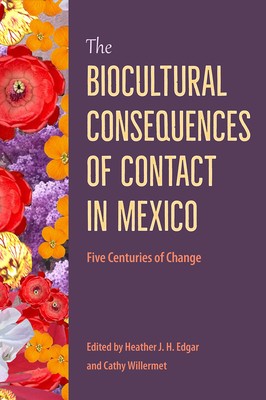
- We will send in 10–14 business days.
- Publisher: University of Florida Press
- ISBN-10: 1683403509
- ISBN-13: 9781683403500
- Format: 15.2 x 22.9 x 1.8 cm, hardcover
- Language: English
- SAVE -10% with code: EXTRA
The Biocultural Consequences of Contact in Mexico (e-book) (used book) | bookbook.eu
Reviews
Description
Examining the long-lasting effectsof European colonization on Mexican populations
The Biocultural Consequences of
Contact in Mexico explores
how Mexican populations have been shaped both culturally and biologically by
the arrival of Spanish conquistadors and the years following the defeat of the
Aztec empire in 1521. Contributors to this volume draw on a diverse set of
methods from archaeology, bioarchaeology, genetics, and history to examine the
response to European colonization, providing evidence for the resilience of the
Mexican people in the face of tumultuous change. Essays focus on Central Mexico,
Yucatan, and Oaxaca, providing a cross-regional perspective, and they highlight
Mexican scholars' work and viewpoints. They examine the effects of the castas
system--which the colonizers used to organize society according to parentage and
the social construction of race--on individuals' and groups' access to power,
social mobility, health, and mate choice. Contributors illuminate the poorly
understood extent that this system--and the national identity of mestizaje that replaced it--caused inequality and the structural violence of stress and health
disparities, as well as genetic admixture. Five hundred years after the Spanish
first clashed with Aztec forces and began to influence modern Mexico, this
volume adds to discussions of colonialism, the reconstruction of biosocial
relationships, and the work of decolonization. Students and scholars in
anthropology and history will gain insights into how human populations transform
and adapt in the wake of major historical events that result in migration,
demographic change, and social upheaval.
Contributors: Josefina Bautista MartÃnez Alfredo Coppa Andrea Cucina Heather
J. H. Edgar Blanca Z. González-Sobrino MarÃa Teresa Jaén Esquivel Haagen
D. Klaus Michaela Lucci Abigail Meza-Peñaloza Emily Moes Corey S.
Ragsdale Katelyn M. Rusk Robert C. Schwaller Julie K. Wesp Cathy
Willermet A volume in the series Bioarchaeological Interpretations of the Human
Past: Local, Regional, and Global Perspectives, edited by Clark Spencer Larsen
EXTRA 10 % discount with code: EXTRA
The promotion ends in 20d.14:28:56
The discount code is valid when purchasing from 10 €. Discounts do not stack.
- Publisher: University of Florida Press
- ISBN-10: 1683403509
- ISBN-13: 9781683403500
- Format: 15.2 x 22.9 x 1.8 cm, hardcover
- Language: English English
of European colonization on Mexican populations
The Biocultural Consequences of
Contact in Mexico explores
how Mexican populations have been shaped both culturally and biologically by
the arrival of Spanish conquistadors and the years following the defeat of the
Aztec empire in 1521. Contributors to this volume draw on a diverse set of
methods from archaeology, bioarchaeology, genetics, and history to examine the
response to European colonization, providing evidence for the resilience of the
Mexican people in the face of tumultuous change. Essays focus on Central Mexico,
Yucatan, and Oaxaca, providing a cross-regional perspective, and they highlight
Mexican scholars' work and viewpoints. They examine the effects of the castas
system--which the colonizers used to organize society according to parentage and
the social construction of race--on individuals' and groups' access to power,
social mobility, health, and mate choice. Contributors illuminate the poorly
understood extent that this system--and the national identity of mestizaje that replaced it--caused inequality and the structural violence of stress and health
disparities, as well as genetic admixture. Five hundred years after the Spanish
first clashed with Aztec forces and began to influence modern Mexico, this
volume adds to discussions of colonialism, the reconstruction of biosocial
relationships, and the work of decolonization. Students and scholars in
anthropology and history will gain insights into how human populations transform
and adapt in the wake of major historical events that result in migration,
demographic change, and social upheaval.
Contributors: Josefina Bautista MartÃnez Alfredo Coppa Andrea Cucina Heather
J. H. Edgar Blanca Z. González-Sobrino MarÃa Teresa Jaén Esquivel Haagen
D. Klaus Michaela Lucci Abigail Meza-Peñaloza Emily Moes Corey S.
Ragsdale Katelyn M. Rusk Robert C. Schwaller Julie K. Wesp Cathy
Willermet A volume in the series Bioarchaeological Interpretations of the Human
Past: Local, Regional, and Global Perspectives, edited by Clark Spencer Larsen


Reviews